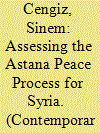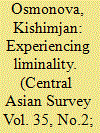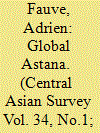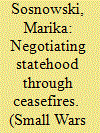|
|
|
Sort Order |
|
|
|
Items / Page
|
|
|
|
|
|
|
| Srl | Item |
| 1 |
ID:
174375


|
|
|
|
|
| Summary/Abstract |
Since 2011, numerous peace initiatives have been initiated out by several actors to end the Syrian civil war in a peaceful way. This article presents the “Astana Peace Process” brokered by Russia, Turkey, and Iran in early 2017 as a case study of a mediation and examines its predecessors to understand the reasons for the failures of those attempts and develops an assessment of the Astana peace process itself. To gain a better understanding of the Astana peace process, this article incorporates the efforts of main actors, their approaches, and the context of the war. In doing so, the article begins by describing the background of the civil war and then uses traditional concepts in mediation theory to elucidate the limitations of the unsuccessful attempts. Next, it investigates how the Astana peace process was different and the driving factors that encouraged the states to engage in this process and argues that Astana peace process’s overall effectiveness is likely to remain limited due to the conflicting interests of the mediators.
|
|
|
|
|
|
|
|
|
|
|
|
|
|
|
|
| 2 |
ID:
144351


|
|
|
|
|
| Summary/Abstract |
This article is intended to contribute broadly to research in post-socialist urban studies. Based on ethnographic fieldwork and interviews with ‘newcomers’ to the capital, Astana, from different parts of Kazakhstan, I examine the renting practices of newcomers. I analyse the experiences of newcomers in their new urban milieu of Astana, and try to answer the question of what it means to live in the city for various groups of individuals on a daily basis. I examine the Soviet and post-Soviet housing and the continuities of the Soviet legacy when it comes to the institution of propiska (city registration). I show that living in shared flats is a coping strategy to deal with expensive rents and meant to be a transitory step towards homeownership. For this reason many accept high rents and crowded housing as ‘normal’. Furthermore, I argue that informal renting practices are acceptable mostly for young and single people, who are free to experiment with city life, and are on their way to establishing careers and personal lives. However, elderly newcomers and young families with children who do not wish to live in shared flats, but have to rent, feel ‘homeless’ and trapped in ‘liminal housing’. For them, renting is undesirable, and they feel a sense of incarceration if they fail to secure housing.
|
|
|
|
|
|
|
|
|
|
|
|
|
|
|
|
| 3 |
ID:
137238


|
|
|
|
|
| Summary/Abstract |
This paper examines how, in post-Soviet Kazakhstan, both channels of elite and banal nationalism (such as sports and higher education) serve as instruments to promote the country. Through these channels, Kazakhstan is portrayed as an open, dynamic and successful country, an image which is in serious disjuncture with the authoritarian nature of the regime. Taking advantage of massive oil revenues, the government organized a significant OSCE general conference in 2010, while chairing the institution. In addition, it created the Astana professional cycling team, which rapidly became a world leader in the sport. Last but not least, Nazarbayev University, attracting prominent Western scholars, is now designed to make the country compete in the international arena of academic rankings. Domestic and international performances are thus treated as instruments to promote the legitimacy of the state at national and global levels. But this would not be possible without the help of individual actors who actively participate in this process. A close investigation shows that their social capital is based on global connections in various spheres (sports, finance and academia). This paper draws on evidence gathered through qualitative methods of enquiry (participant observation and semi-structured interviews). Finally, Astana is treated as a Latourian actor-network that has its own life and agency, thanks to the global association of various human actors and material objects.
|
|
|
|
|
|
|
|
|
|
|
|
|
|
|
|
| 4 |
ID:
120724


|
|
|
|
|
| Publication |
2013.
|
| Summary/Abstract |
In a world still dominated by a geopolitical system of territorial states, one tool in the state- and nation-building repertoire is the strategy of moving a capital from one city to another, and to an ostensibly more 'central' location of a geometrically conceived territory. From Ankara to Brasília, the technique has been used in a variety of places around the world, and Kazakhstan's new capital since 1997, Astana, is one more recent iteration. Taking a Foucauldian approach to analysing political technologies of government, the author examines the strategy of the centrally located city and considers how it has been instrumental to simultaneously producing a 'state effect' and a 'territory effect' in newly independent Kazakhstan. Part of a larger mixed-methods study, this article draws on a diverse range of methods, including data from interviews, participant observation, textual analysis, focus groups and a country-wide survey.
|
|
|
|
|
|
|
|
|
|
|
|
|
|
|
|
| 5 |
ID:
153973


|
|
|
|
|
| Summary/Abstract |
This article addresses the ways in which the systemic transformation of the former Soviet republics has been reflected in urban development in two capital cities, Minsk (Belarus) and Astana (Kazakhstan). Changes taking place in these capitals have been analysed through the prism of an ideological recycling of the socialist legacy, a concept that permits exploration of which aspects of the socialist legacy have been jettisoned and which retained, in the process of formation of a capital. The article explores the nationalising strategies adopted by Belarus and Kazakhstan and reified by various practices, including those involving the recasting of cities. These strategies, however, are analysed not as inventions of post-Soviet regimes, but as forms of structural continuity.
|
|
|
|
|
|
|
|
|
|
|
|
|
|
|
|
| 6 |
ID:
179931


|
|
|
|
|
| Summary/Abstract |
This paper examines how ceasefires can influence elements of statehood. It adds to scholarship that views statehood as being in a continuous process of change by conceptualising international ceasefires as the negotiation of an embryonic type of wartime order that has ramifications for how power and authority are dispersed among competing actors in civil war. Through the example of the Syrian de-escalation zones, the paper suggests that the ceasefire not only affected the use of violence but recalibrated relations between international and local actors for control over diplomacy, security, territory, and citizenship.
|
|
|
|
|
|
|
|
|
|
|
|
|
|
|
|
| 7 |
ID:
118777


|
|
|
| 8 |
ID:
171125


|
|
|
|
|
| Summary/Abstract |
Trading in Astana’s Central Bazaar rests on mutually beneficial people-to-people contacts, or personal networks. Twenty-five years after the Soviet collapse, personal networks are pivotal in whether one succeeds in an informal market economy. I argue that networks cannot be disassociated from trader motivation, which serves as a measure of how these networks evolve over time. I describe how those traders who were driven primarily by lifting themselves out of economic precarity tended to build strong social networks; these strong social networks sometimes evolved into ‘unconditional’ social networks, by which I mean a trader supporting others even though doing so has no commercial benefit. At the other extreme were traders driven by ambition and goal attainment. I argue that such traders are less likely to establish and maintain social networks. Between these two extremes is a middle ground, where traders alternate between strong and weak social networks.
|
|
|
|
|
|
|
|
|
|
|
|
|
|
|
|
|
|
|
|
|